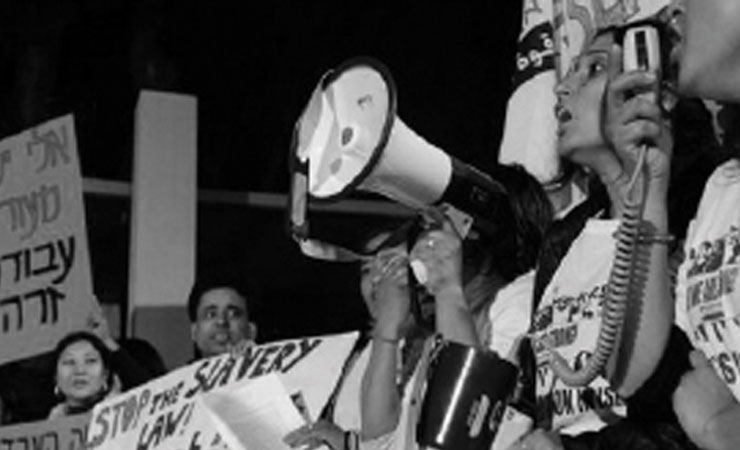August 18, 2014
Kav LaOved estimates that in Israel there are between 4,000-5,500 migrant workers from various countries that are employed in the agriculture industry but who were ostensibly brought to Israel as students participating in international agriculture study programs that circumvent bilateral agreements such as the agreement between Israel and Thailand. Participants are required to pay high fees to participate in the so called “study programs” and there is no supervision of their working or living conditions.
A bilateral agreement between the Israeli and Thai governments was signed in 2009 with the goal of establishing a recruiting process in the agriculture sector assuring organized supervision of international migration (by the International Organization for Migration – IOM). This agreement was designed to prevent the collection of unacceptable and exorbitant fees from migrant workers and to promise fair working conditions for workers from Thailand in Israel.
In the second half of 2012, the first workers within the new framework of recruitment arrived in Israel. They arrived without the engagement of agencies or private manpower companies. However, according to the reports provided by the workers who turned to Kav LaOved for help, it seems that as early as 2013 the international agreement was circumvented and students in agricultural programs were being employed as migrant workers for which they paid very high fees in order to come to Israel.
Kav LaOved estimates that there are 4,000-5,500 students participating in international agricultural study programs in Israel who are being employed as migrant workers in the agricultural industry. The students come from Asia, Africa, and Latin America, and countries including Nepal, Vietnam, Burma, Peru, and Bolivia. In their country of origin, the students were told that they would be studying academic level theoretical and practical agriculture which would be recognized by their country of origin. They were also told that, in addition to their studies, they will work in agricultural and be provided with food and a place to live. The students pay very high fees to participate in these programs.
The picture that is forming from the testimonies gathered from these so-called “students” is very disturbing and there is no supervision of their living and working conditions. The students report that they do not have work permits, only student visas, and that they are made to work six or even seven days a week. Only one day a week is dedicated to academic studies, usually on Sunday, the day a majority of students consider their day of rest. On this day they are taught some very basic agricultural skills until the afternoon, after which they are required to return to work on the farms. In addition, the students report that they earn only between 15-17 NIS per hour without benefits, including overtime and work on rest days, and sometimes they work more than 12 hours a day. Additional violations were reported when the Kav LaOved staff visited their sub-standard living quarters and discovered that their salary was being withheld.
In the light of the many calls received by Kav LaOved from students that reported violation of their rights, we turned to the Foreign Ministry and the Population and Immigration Authority earlier this year with a request to look into the matter. The official letter states, “It is clear that these programs represent a violation of Israeli law and are suspect of exploiting people from weak countries due to the economic interest of the farmers to lower the cost of hiring workers and circumventing of the need for work permits… we request that you look into the enclosed information.”
According to Michal Tadjer, Labor Law Attorney at Kav LaOved, “There is a real suspicion that the study programs, in their existing format, are in offence of the laws of the state while constituting an abuse of the citizens from weak countries under the guise of promises to combine academic level studies with farm work. These programs serve the economic interests of farmers, local authorities, and private economic entities, resulting in the maximization of their profits at the expense of the students while the beneficiaries of this economic exploitation completely by-pass all modes of enforcement of both immigration and labor laws.”
Knesset Member Michal Rozin, Chair of the Committee for Foreign Workers, announced that, as a result of the request made by Kav LaOved, she will call a special session on this subject. She stated, “These programs raise serious suspicions regarding exploitation of people from weaker countries for economic self-interest. I support the farmers and understand their great need for workers but the state must find a solution to this crisis – not through the deception and the exploitation of workers.”
Chit Wann Aung, a student from Myanmar, reported that he “met the representatives of the work study program in Myanmar and they convinced me to join. I arrived in Israel with the understanding that I will be studying agriculture at an academic level. I went through interviews and a registration and acceptance process to participate in the program. Today I study only basic agriculture one day a week until 15:00 and I work for the rest of the day. During the rest of the week I work 15 hours a day. Each time I or my friends wish to complain about our living conditions, our work conditions or our studies, we are threatened that they will send us back to Myanmar and that we will lose the money that we invested in the program. I only ask that we be treated fairly and that the program directors carry out their responsibilities to us.”
Translation: Sharon Kerpel


